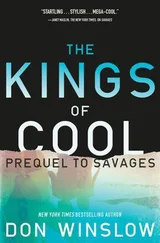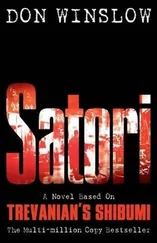I saw him in a dream. The spirit of Adán came to me and told me everything will be all right.
Like Jesus, Elena thinks, resurrection is always possible when there’s no body. And just like Jesus, Adán now has disciples.
Elena walks from the living room into the enormous kitchen. She’s thought of selling and downsizing now that her sons are grown and out. The maids busy preparing breakfast look away and seem even busier as they try to avoid her glance. The servants always know first, Elena thinks. Somehow they always hear of every death, every birth, every hurried engagement or secret affair before we do.
Elena pours herself a cup of herbal tea and walks out onto the deck. Her house is in the hills above the city and she looks down at the bowl of polluted smoke that is Tijuana and thinks of all the blood that her family shed—in both the active and passive sense—to control this place.
Her brother Adán and her brother Raúl—long dead—had done that, taken the Baja plaza and turned it into the base of a national empire that had risen and fallen and risen again, and now …
Now Iván Esparza has it.
Just as he will have Adán’s crown.
With Adán’s sons mere toddlers, Iván is next in the line of succession. The news of Guatemala had barely reached their ears before he was ready to declare his father and Adán dead and announce that he was taking over.
Elena and Núñez talked him down from that tree.
“It’s premature,” Núñez said. “We don’t yet know for a fact that they’re dead, and you really don’t want to step up to the top position anyway.”
“Why not?” Iván demanded.
“It’s too dangerous,” Núñez said. “Too exposed. In the absence of your father and Adán, we don’t know who will stay loyal.”
“Some ambiguity over their deaths has its uses,” Elena said. “The doubt about whether they might be alive keeps the wolves at bay for a while. But if you announce that the king is dead, everyone from the dukes to the barons to the knights to the peasants will see a weakness in the Sinaloa cartel as a chance to seize the throne.”
Iván reluctantly agreed to wait.
He’s a classic, almost stereotypical third-generation spoiled narco brat, Elena thinks. Hotheaded, violently inclined. Adán didn’t like or trust him and worried about his taking over when Nacho died or retired.
So do I, Elena thinks.
But the only alternatives are her own sons.
They’re Adán’s true nephews, the Barrera blood flows through them. Her oldest son, Rudolfo, has done his time, figuratively and literally. He went into the family business young, trafficking cocaine from Tijuana into California, and did well for years—bought nightclubs, owned top recording bands, and managed champion boxers. A beautiful wife and three beautiful children.
No one loved life more than Rudolfo.
Then he sold 250 grams of coke to a DEA undercover at a motel in San Diego.
Two hundred and fifty grams, Elena thinks. So stupid, so small. They’ve moved tons of cocaine in the States, and poor Rudolfo went down for less than half a pound. The American judge sentenced him to six years in a federal prison.
A “supermax.”
Florence, Colorado.
Because, Elena thinks, he bore the name “Barrera.”
It took everything the family had—money, power, influence, lawyers, blackmail and extortion, but they got him out—well, Adán got him out—after only eighteen months.
Only eighteen months, she reflects.
A year and a half in a seven-by-twelve cell, twenty-three hours a day, alone. An hour a day for a shower, or exercise in a cage with a glimpse of the sky.
When he returned, coming across the Paso del Norte Bridge into Juárez, Elena barely recognized him. Gaunt, pale, haunted—a ghost. Her life-loving son, at thirty-five, looked more like sixty.
That was a year ago.
Now Rudolfo focuses on his “legitimate” business, nightclubs in Culiacán and in Cabo San Lucas, and music—the various bands that he produces and promotes. Sometimes he talks about getting back into la pista secreta, but Elena knows he’s afraid of ever going back to prison. Rudolfo will say that he wants the chair at the head of the table, but he’s lying to himself.
Luis, her baby, she doesn’t worry about. He went to college to become an engineer, God bless him, and wants nothing to do with the family business.
Well, good, Elena thinks now.
It’s what we wanted, isn’t it? It’s what we always intended—for our generation to make the family fortune in the trade so that our children wouldn’t need to. Because the trade has brought us riches beyond imagining, but it has also brought us to the cemetery time and again.
Her husband, her uncle—the patriarch “Tío” Barrera—her brother Raúl, and now her brother Adán is dead. Her nephew Salvador, and so many cousins and in-laws and friends.
And enemies.
Güero Méndez, the Tapia brothers, so many others that Adán defeated. They fought for “turf,” she thinks, and the only turf they eventually, inevitably, inherit and share is the cemetery.
Or the prisons.
Here in Mexico or El Norte.
In cells for decades or for the rest of their lives.
A living death.
So if Rudolfo wants to run a nightclub and play at making music, and Luis wants to build bridges, so much the better.
If the world will let them.
“We’re all going to die young anyway!” Ric Núñez announces. “Let’s make legends while we’re doing it!”
It’s been a night of Cristal and coke at Rudolfo Sánchez’s new club, the Blue Marlin. Well, that’s where they wound up; part of the group informally known as Los Hijos—Ric, the Esparza brothers, Rubén Ascensión—and a host of girls had been hitting all the trendy clubs in Cabo, going from VIP room to VIP room, usually comped but leaving hefty tips, and then they were in a private room at the Marlin when Ric got the idea to “take it to the next level.”
He takes out his .38 Colt and sets it on the table.
Can you imagine the songs they’ll write? Ric thinks. The corridos about young people, the scions of the drug cartels, decked out in Armani, Boss, Gucci; driving Rolls, Ferraris; snorting primo blow through hundred-dollar bills, throwing it all away on a game?
They’ve been together forever, Los Hijos. Went to school together in Culiacán, played together at their parents’ parties, went on vacations together to Cabo and Puerto Vallarta. Snuck off and drank beer together, smoked weed, picked up girls. A few of them did a couple of semesters of college, most went straight into the family business.
They knew who they were.
The next generation of the Sinaloa cartel.
The sons.
Los Hijos.
And the girls? They always get the best girls. Ever since middle school, even more so now. Of course they do—they have looks, clothes, money, drugs, guns. They have the swag—they go to the VIP rooms, get the best tables at the best restaurants, front-row seats and backstage passes to the hot concerts; shit, the bands sing songs to them, about them. Maître d’s open doors and women open up their legs.
Los Hijos.
Now one of Iván’s bitches takes out her phone and screams, “It would be a million YouTube hits!”
Fucking awesome, Ric thinks. Someone blowing his brains out on a vid-clip, over a dare. Show the world we just don’t give a shit, we’re capable of anything, anything . “Okay, whoever the barrel points to puts it to his head and pulls the trigger. If he survives, we do it again.”
He spins it.
Hard.
Everyone holds their breath.
The barrel points right back at him.
Iván Esparza explodes in laughter. “Fuck you, Ric!”
Читать дальше












